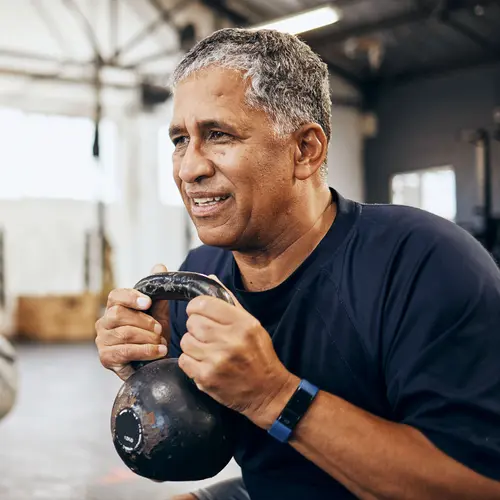Heat exhaustion is a heat-related illness that can occur after you've been exposed to high temperatures, and it often is accompanied by dehydration.
There are two types of heat exhaustion:
- Water depletion. Signs include excessive thirst, weakness, headache, and loss of consciousness.
- Salt depletion. Signs include nausea and vomiting, muscle cramps, and dizziness.
Although heat exhaustion isn't as serious as heat stroke, it isn't something to be taken lightly. Without proper intervention, heat exhaustion can progress to heat stroke, which can damage the brain and other vital organs, and even cause death.
Symptoms of Heat Exhaustion
The most common signs and symptoms of heat exhaustion include:
- Confusion
- Dark-colored urine (a sign of dehydration)
- Dizziness
- Fainting
- Fatigue
- Headache
- Muscle or abdominal cramps
- Nausea, vomiting, or diarrhea
- Pale skin
- Profuse sweating
- Rapid heartbeat
Treatment for Heat Exhaustion
If you, or anyone else, has symptoms of heat exhaustion, it's essential to immediately get out of the heat and rest, preferably in an air-conditioned room. If you can't get inside, try to find the nearest cool and shady place.
Other recommended strategies include:
- Drink plenty of fluids, especially sports drinks to replace lost salt (avoid caffeine and alcohol).
- Remove any tight or unnecessary clothing.
- Take a cool shower, bath, or sponge bath.
- Apply other cooling measures such as fans or ice towels.
If such measures fail to provide relief within 15 minutes, seek emergency medical help, because untreated heat exhaustion can progress to heat stroke.
After you've recovered from heat exhaustion, you'll probably be more sensitive to high temperatures during the following week. So it's best to avoid hot weather and heavy exercise until your doctor tells you that it's safe to resume your normal activities.
Risk Factors for Heat Exhaustion
Heat exhaustion is strongly related to the heat index, which is a measurement of how hot you feel when the effects of relative humidity and air temperature are combined. A relative humidity of 60% or more hampers sweat evaporation, which hinders your body's ability to cool itself.
The risk of heat-related illness dramatically increases when the heat index climbs to 90 degrees or more. So it's important -- especially during heat waves -- to pay attention to the reported heat index, and also to remember that the heat index is even higher when you are standing in full sunshine.
If you live in an urban area, you may be especially prone to develop heat exhaustion during a prolonged heat wave, particularly if there are stagnant atmospheric conditions and poor air quality. In what is known as the "heat island effect," asphalt and concrete store heat during the day and only gradually release it at night, resulting in higher nighttime temperatures.
Other risk factors associated with heat-related illness include:
- Age. Infants and children up to age 4, and adults over age 65, are particularly vulnerable because they adjust to heat more slowly than other people.
- Certain health conditions. These include heart, lung, or kidney disease, obesity or underweight, high blood pressure, diabetes, mental illness, sickle cell trait, alcoholism, sunburn, and any conditions that cause fever. People with diabetes are at increased risk of emergency room visits, hospitalization, and death from heat-related illness and may be especially likely to underestimate their risk during heat waves.
- Medications. These include some medicines in the following classes: diuretics, sedatives, tranquilizers, stimulants, heart and blood pressure medications, and medications for psychiatric conditions.
Check with your doctor to see if your health conditions and medications are likely to affect your ability to cope with extreme heat and humidity.
Preventing Heat Exhaustion
When the heat index is high, it's best to stay inside in air conditioning. If you must go outdoors, you can prevent heat exhaustion by taking these steps:
- Wear lightweight, light-colored, loose-fitting clothing, and a wide-brimmed hat.
- Use a sunscreen with an SPF of 30 or more.
- Drink extra fluids. To prevent dehydration, drink plenty of water, fruit juice, or vegetable juice per day. Because heat-related illness also can result from salt depletion, it may be advisable to substitute an electrolyte-rich sports drink for water during periods of extreme heat and humidity. Ask your doctor about the best types of fluid and how much you should be drinking.
- A general recommendation for those doing moderate- to high-intensity exercise is to drink 17 to 20 ounces of fluid two to three hours before exercise, and consider adding another eight ounces of water or sports drink right before exercise. During exercise, you should consume another seven to ten ounces of water every 20 minutes, even if you don't feel thirsty. Also, drink another 8 ounces within a half hour after exercise. Take additional precautions when exercising or working outdoors.
- Avoid fluids containing either caffeine or alcohol, because both substances can make you lose more fluids and worsen heat exhaustion. If you have epilepsy or severe heart, kidney, or liver disease, are on a fluid-restricted diet, or have a problem with fluid retention, check with your doctor before increasing liquid intake.

